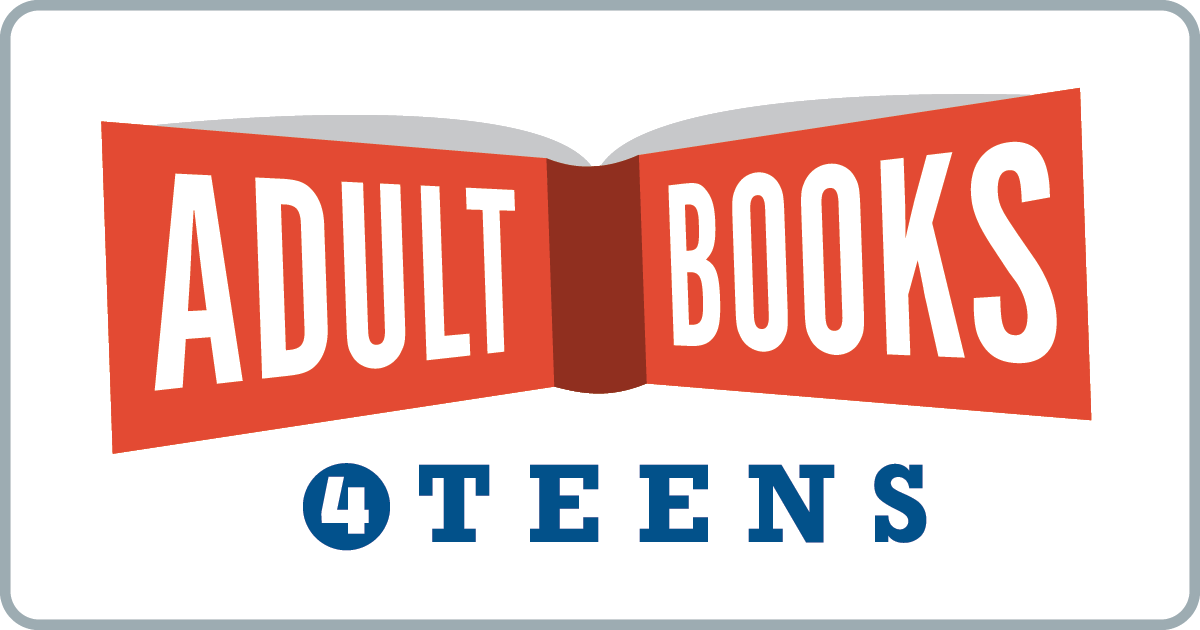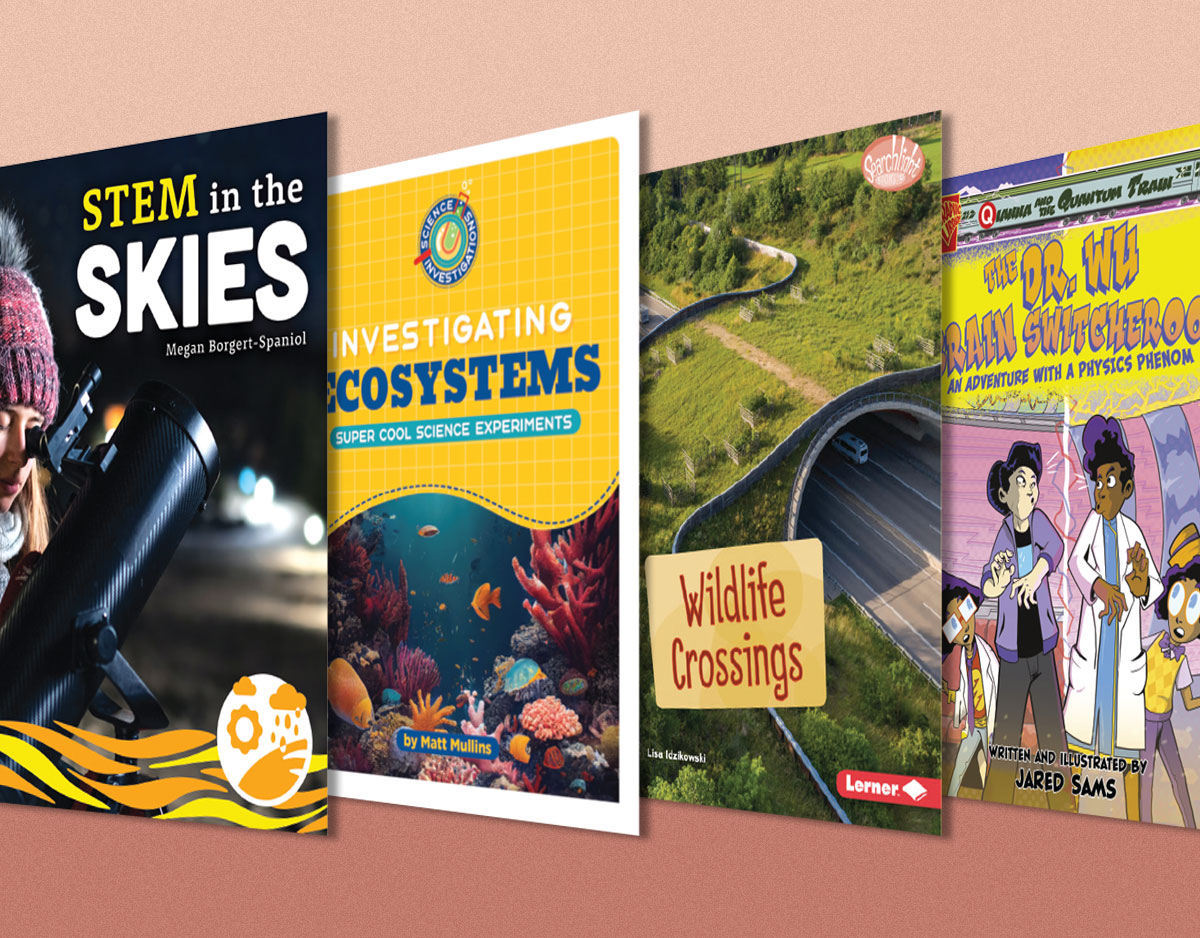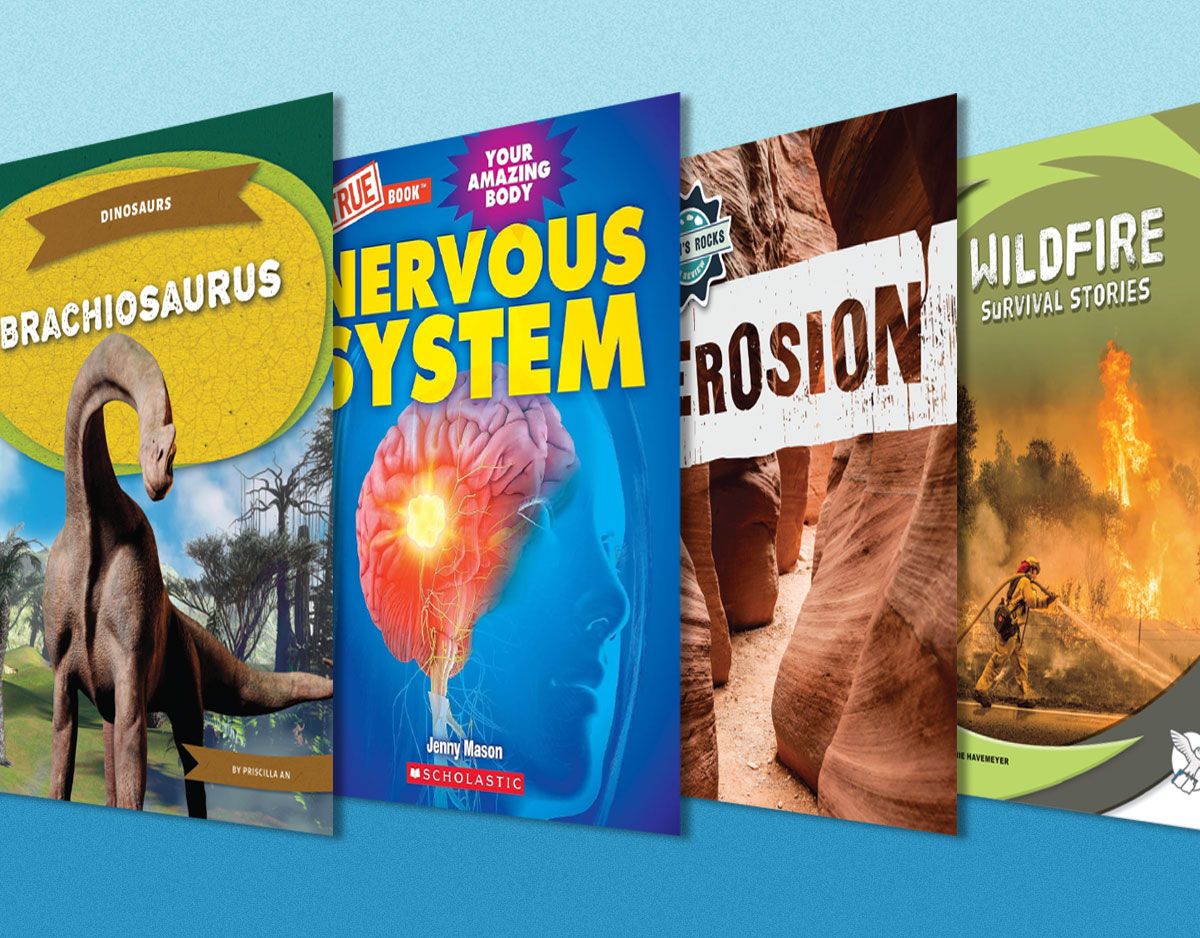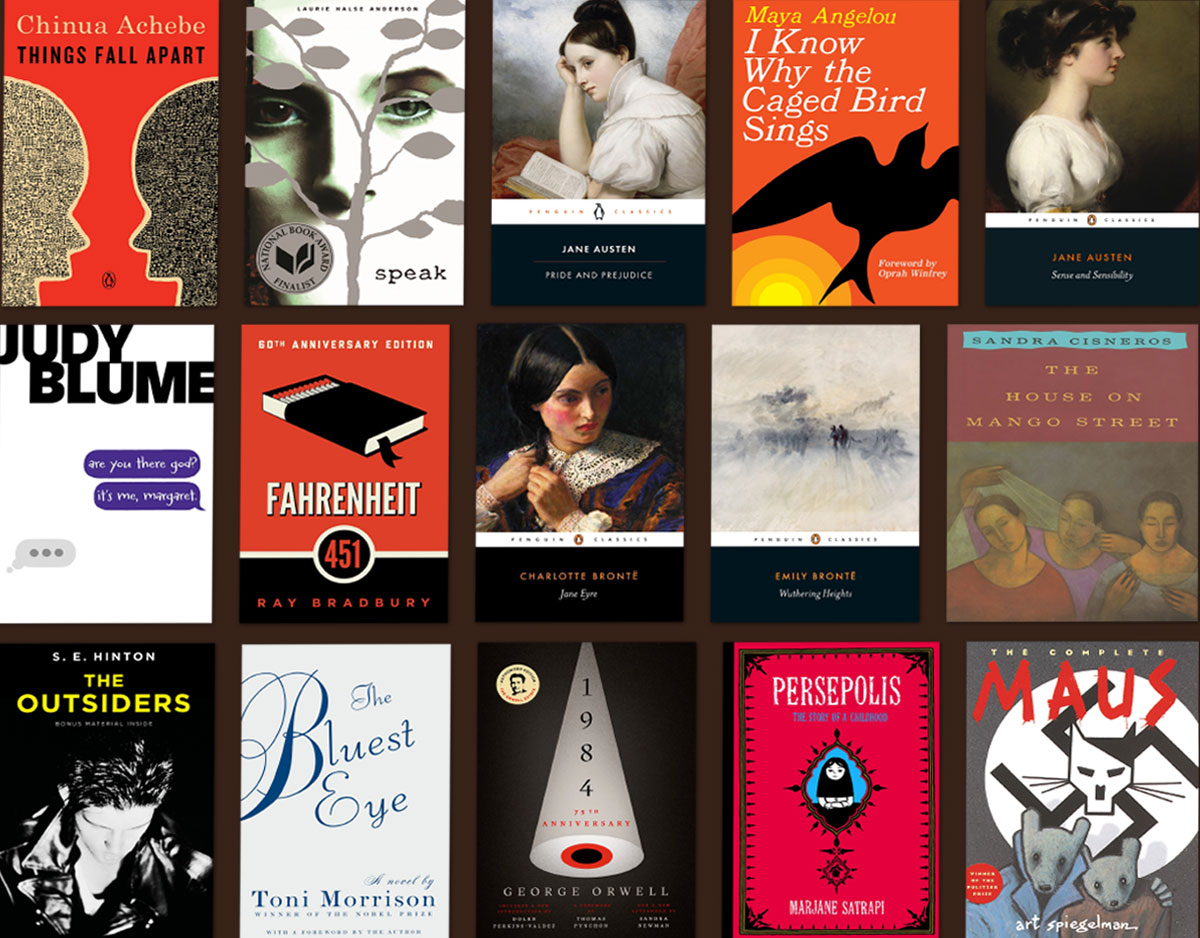SCROLL DOWN TO READ THE POST
Humor
If you want to send me into paroxysms of terror and self-doubt, just send a 13-year-old up to me to ask me for a “funny book.” Part of the reason that this is my least favorite reader’s advisory question is that humor is so personal–how do I know what this stranger in front of me will find funny? But it is also because humor can be found hiding in so many different genres that I find myself paralyzed by the overabundance of choices. Is this teen looking for an adventure-comedy? A horror-comedy? A romantic-comedy? Comic books? I often find myself trying to describe to a teen why a book is funny and finding myself completely at a loss. Just take a look at the three books below. First up, we have Kevin Cannon’s Crater XV: it’s a graphic novel (it’s a “comic”! easy! well, except all those GNs that aren’t comic at all), it’s an adventure story, it’s got a bizarre science-fiction plot. The jokes range from the hilariously specific sound-effects (fairly easy to point out and describe) to the ridiculousness of the overall structure of the piece (decidely less so).
Then there’s the question of how much background knowledge you need to get humor. Mark H. Williams’s Sleepless Knights is an Arthurian parody: a pretty easy sell to anyone who loves Monty Python and the Holy Grail (that’s still a thing with teens, right?), but what if they haven’t seen that movie? (And by the way, have you seen this?) Will they understand the Arthur references? Is the fact of medieval knights walking around in the present day funny enough even if you don’t know much about Arthurian legend? Then again, a lot of the humor comes from the narrator’s belief in always being a great butler–do you need to know something about the English class system to get it, or is it intrinsically funny? I dunno–all I know is that I found it hilarious, and I have a feeling that even if teens don’t know all the references, many of them will too.
ADVERTISEMENT
ADVERTISEMENT
And we have the question of political correctness. Is Graeme Simsion’s The Rosie Project making fun of people with autism? Certainly, much of the humor comes from the narrator’s unique way of seeing the world, but my gut instinct is that Simsion is using this viewpoint to make fun of humanity at large, in the same way that Matt Haig’s far less successful The Humans (S & S, 2013) did earlier this year by using a highly logical alien narrator to comment on human absurdity.
Speaking of absurdity, all three of these books use absurdity to varying degrees–especially plot absurdity: wacky science-fiction, mistaken identities, knights roaming around London, time stopping, misunderstandings, an autistic character being forced to memorize a bartender’s manual and mix drinks. Personally, I find all of this invigorating and highly amusing, but I know there are a lot of people out there with lower tolerances for absurdity than me. So we’re back to that first question: how to know what someone else will find funny. If anyone knows a good solution, let me know. In the meantime, recommend these three hilarious books at your own peril.
CANNON, Kevin. Crater XV. 494p. Top Shelf. July 2013. Tr $19.95. ISBN 9781603091008.
 Adult/High School–In this madcap sequel to Far Arden (Top Shelf, 2009), Cannon cranks the preposterousness up to eleven, to deliriously fun effect. Reeling from the death of his nephew, Arctic pirate Army Shanks has grown out his beard and is looking for a one-way trip to Antarctica (Arctic pirate speak for suicide), when two women pull him out of his malaise and into the middle of an increasingly ridiculous adventure. First up is Wendy, who is looking to somehow catch a ride to Jupiter’s moon of Europa, and who sparks a protective streak in Shanks. She quickly stumbles on a supposedly long-abandoned Canadian space project that is actually still in operation. Meanwhile, the other woman in Shanks’s life is Molniya, whom he mistakes for his childhood sweetheart, but who is actually the wife of a Russian freighter captain who claims to be sending a rocket to the moon to obtain a newly discovered source of unlimited energy. Soon a space race is on between Russia and Canada, and all bets are off, as the intrigue, coincidences, and bumbling pile up. Cannon’s black-and-white ink-work is precise and witty, and his visuo-sound effects (“look around in a touristy way”; “mold into knife”; “general commotion”) are hilarious. Humor, pirates, space, romance: teen graphic novel readers in search for something a bit off-beat should find plenty to love.–Mark Flowers, John F. Kennedy Library, Vallejo, CA
Adult/High School–In this madcap sequel to Far Arden (Top Shelf, 2009), Cannon cranks the preposterousness up to eleven, to deliriously fun effect. Reeling from the death of his nephew, Arctic pirate Army Shanks has grown out his beard and is looking for a one-way trip to Antarctica (Arctic pirate speak for suicide), when two women pull him out of his malaise and into the middle of an increasingly ridiculous adventure. First up is Wendy, who is looking to somehow catch a ride to Jupiter’s moon of Europa, and who sparks a protective streak in Shanks. She quickly stumbles on a supposedly long-abandoned Canadian space project that is actually still in operation. Meanwhile, the other woman in Shanks’s life is Molniya, whom he mistakes for his childhood sweetheart, but who is actually the wife of a Russian freighter captain who claims to be sending a rocket to the moon to obtain a newly discovered source of unlimited energy. Soon a space race is on between Russia and Canada, and all bets are off, as the intrigue, coincidences, and bumbling pile up. Cannon’s black-and-white ink-work is precise and witty, and his visuo-sound effects (“look around in a touristy way”; “mold into knife”; “general commotion”) are hilarious. Humor, pirates, space, romance: teen graphic novel readers in search for something a bit off-beat should find plenty to love.–Mark Flowers, John F. Kennedy Library, Vallejo, CA
WILLIAMS, Mark H. Sleepless Knights. 410p. Atomic Fez. Aug. 2013. Tr $24.99. ISBN 9781927609019.
 Adult/High School-Everyone knows that King Arthur lives forever in legend, but in Williams’s new comic novel, Arthur literally lives forever, along with five of the best Knights of the Round Table and his trusty butler, Sir Lucas, the narrator. Since being granted immortality by the Grail, sometime in the sixth century, the seven immortals have been continuing the Eternal Quest for “truth, justice, and the Arthurian way,” though now they seem to be getting a bit rusty. Indeed, as the novel begins and Sir Lucas rounds up the knights for their yearly drink of immortality, they immediately begin to bumble their way into exposing their identities to the public at large. Arthur decides the answer to their problems is to call Merlin back from the dead, a solution with dire consequences, as it simultaneously opens a portal to hell, unleashing first dragons, then an army of the dead, and eventually Morgan le Fay herself. Fifteen hundred years of bad blood among the knights boil over, and it is left to the ever-level-headed Lucas to pull them together. Williams is far from the first novelist to take a parodical approach to Arthurian legend, but he takes to it with fresh vigor and great aplomb. The knights are fully realized, while holding closely enough to their mythic selves to yield great humor. And just as the plot seems ready to reel out of control, readers realize that Williams has had a plan all along. Teens who have graduated from Rick Yancey’s “Alfred Kropp” series (Bloomsbury) will love this new take on a very old story.-Mark Flowers, John F. Kennedy Library, Vallejo, CA
Adult/High School-Everyone knows that King Arthur lives forever in legend, but in Williams’s new comic novel, Arthur literally lives forever, along with five of the best Knights of the Round Table and his trusty butler, Sir Lucas, the narrator. Since being granted immortality by the Grail, sometime in the sixth century, the seven immortals have been continuing the Eternal Quest for “truth, justice, and the Arthurian way,” though now they seem to be getting a bit rusty. Indeed, as the novel begins and Sir Lucas rounds up the knights for their yearly drink of immortality, they immediately begin to bumble their way into exposing their identities to the public at large. Arthur decides the answer to their problems is to call Merlin back from the dead, a solution with dire consequences, as it simultaneously opens a portal to hell, unleashing first dragons, then an army of the dead, and eventually Morgan le Fay herself. Fifteen hundred years of bad blood among the knights boil over, and it is left to the ever-level-headed Lucas to pull them together. Williams is far from the first novelist to take a parodical approach to Arthurian legend, but he takes to it with fresh vigor and great aplomb. The knights are fully realized, while holding closely enough to their mythic selves to yield great humor. And just as the plot seems ready to reel out of control, readers realize that Williams has had a plan all along. Teens who have graduated from Rick Yancey’s “Alfred Kropp” series (Bloomsbury) will love this new take on a very old story.-Mark Flowers, John F. Kennedy Library, Vallejo, CA
SIMSION, Graeme. The Rosie Project. 304p. S. & S. Oct. 2013. Tr $24. ISBN 9781476729084; ebook ISBN 9781476729107.
 Adult/High School-In Simsion’s acutely funny debut novel, narrator Don Tillman manages his (never quite specified) autistic behaviors through a heavily regimented schedule, including such marvels as the Standardized Meal System. His newest life plan is The Wife Project, an attempt to locate the perfect life-partner using a questionnaire that includes the “multiple-choice questions, Likert scales, cross-validation, dummy questions, and surrogates.” Needless to say, it is less than a success, but through a misunderstanding it does lead to a date with Rosie, a young bartender who is seemingly the opposite of everything Don is looking for. Though neither Rosie nor Don thinks of the other as dating material, they develop a friendship around Don’s attempts to help Rosie track down her biological father, and slowly (and predictably) their feelings for each other develop. Simsion’s chosen genre of the romantic comedy (telegraphed by copious references to famous films) practically requires a certain level of plot implausibility and character misunderstandings, but he more than compensates by being both funnier and smarter than most genre entries. His humor is rooted in Don’s autistic tendencies–but always aimed away from Don and toward the irrationality of non-austitic behaviors. And his smartness is rooted in a deep understanding of plot structure, and in some very penetrating questions about the ethics of breaking rules, the distinction between one’s self and one’s behavior, and the nature of love. Teens will love the awkward romance, so close in many ways to a teenaged one, and the absurd humor.-Mark Flowers, John F. Kennedy Library, Vallejo, CA
Adult/High School-In Simsion’s acutely funny debut novel, narrator Don Tillman manages his (never quite specified) autistic behaviors through a heavily regimented schedule, including such marvels as the Standardized Meal System. His newest life plan is The Wife Project, an attempt to locate the perfect life-partner using a questionnaire that includes the “multiple-choice questions, Likert scales, cross-validation, dummy questions, and surrogates.” Needless to say, it is less than a success, but through a misunderstanding it does lead to a date with Rosie, a young bartender who is seemingly the opposite of everything Don is looking for. Though neither Rosie nor Don thinks of the other as dating material, they develop a friendship around Don’s attempts to help Rosie track down her biological father, and slowly (and predictably) their feelings for each other develop. Simsion’s chosen genre of the romantic comedy (telegraphed by copious references to famous films) practically requires a certain level of plot implausibility and character misunderstandings, but he more than compensates by being both funnier and smarter than most genre entries. His humor is rooted in Don’s autistic tendencies–but always aimed away from Don and toward the irrationality of non-austitic behaviors. And his smartness is rooted in a deep understanding of plot structure, and in some very penetrating questions about the ethics of breaking rules, the distinction between one’s self and one’s behavior, and the nature of love. Teens will love the awkward romance, so close in many ways to a teenaged one, and the absurd humor.-Mark Flowers, John F. Kennedy Library, Vallejo, CA
Filed under: Weekly Reviews
About Mark Flowers
Mark Flowers is the Young Adult Librarian at the John F. Kennedy Library in Vallejo, CA. He reviews for a variety of library journals and blogs and recently contributed a chapter to The Complete Summer Reading Program Manual: From Planning to Evaluation (YALSA, 2012). Contact him via Twitter @droogmark
ADVERTISEMENT
SLJ Blog Network
Name That LEGO Book Cover! (#53)
Cover Reveal and Q&A: The One and Only Googoosh with Azadeh Westergaard
Exclusive: Vol. 2 of The Weirn Books Is Coming in October | News
Take Five: Middle Grade Anthologies and Short Story Collections
The Classroom Bookshelf is Moving
ADVERTISEMENT
ADVERTISEMENT







